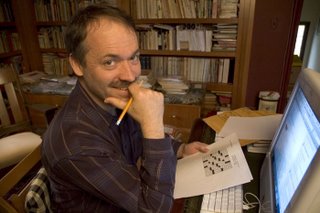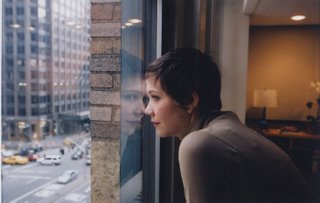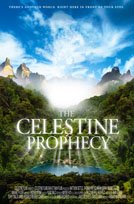Tuesday, August 15, 2006
August 18 - 24 Wordplay
 Nightly at 7 & 9pm, Sun Mat at 3pm. PG 94 min. D: Patrick Creadon. Will Shortz, Jon Stewart, Bill Clinton, Bob Dole.
Nightly at 7 & 9pm, Sun Mat at 3pm. PG 94 min. D: Patrick Creadon. Will Shortz, Jon Stewart, Bill Clinton, Bob Dole. Inky-fingered NEW YORK TIMES readers often love to attempt the mind-bending crossword puzzles lovingly created for the paper by longstanding contributor Will Shortz. There are few things more satisfying than completing one of Shortz's puzzles, and a cult has sprung up around the enigmatic crossword compiler. Director Patrick Creadon has capitalized on this phenomenon with this documentary based around Shortz and his devoted followers.
“Oh, Beckham can bend it and Shaq can dunk, but, in the annals of spectator sports, nothing can compare with the sight of rugged down-and-acrossers strutting their stuff on the vast playing field of words." Rick Groen, GLOBE AND MAILWordplay review by Justin Chang, VARIETY
Punsters, linguists and crossword puzzle fanatics everywhere couldn't ask for a more bracing tribute than helmer Patrick Creadon's buoyant and exhilaratingly brainy doc "Wordplay." Initially conceived as a profile of peerless puzzlemaker Will Shortz, the pic unveils a "Spellbound"-style gallery of competitive crossword pros, ultimately becoming a moving and eloquent valentine to the English language. IFC Films should have no trouble positioning this irresistible item as an arthouse draw with serious crossover potential.
Docu also happens to be an exceedingly warm piece of publicity for the New York Times, where Shortz has edited the daily crossword puzzle for 12 years. Celebrity subjects -- including Bill Clinton, the Indigo Girls, filmmaker Ken Burns and Yankees pitcher Mike Mussina -- all swear by the Times puzzle as the gold standard (Jon StewartJon Stewart even admits that he'll do the USA Today crossword, "but I won't feel good about myself").
While the resulting work is unmistakably East Coast-centric, right down to its finale at the American Crossword Puzzle Tournament in Stamford, Conn., it's marred by neither condescension nor cultural snobbery. Creadon, who also serves as d.p.d.p., is intoxicated by the brilliance of those who construct puzzles and those who solve them, and he regards his subjects with a clear eye for both their razor-sharp wits and their endearing eccentricities.
Pic kicks off with a concise and frequently hilarious portrait of Shortz, a lifelong puzzleholic who went so far as to create his own major, "enigmatology," at Indiana U. Occupying almost as much screentime is his colleague Merl Reagle, who delivers an engrossing primer on the basic rules, goals and techniques of constructing a crossword puzzle.
Even more intriguing are the speedy and compulsive puzzle addicts who take the stage one by one -- past champ Ellen Ripstein; perennial runner-up Al Sanders; Trip Payne, who waxes passionately about the letter "Q"; and frat boy prodigy Tyler Hinman.
Showdown at the March 2005 tournament inevitably falls short of the nail-biting suspense of "Spellbound," as there's nothing inherently thrilling about the sight of hundreds of people poring over crossword puzzles. Once the gang is whittled down to the final three, however, docu comes through with an intellectually and emotionally wrenching climax that Hollywood couldn't have scripted better.
If "Wordplay" is largely a triumph of superior content over merely serviceable form, Brian Oakes' titling and graphics design nevertheless devises ingenious visual strategies to illustrate the process of puzzle-solving, creating a play-along interactivity that audiences will find stimulating, if not intimidating.
Saturday, August 12, 2006
August 11th - 17th The Great New Wonderful

Nightly at 7 & 9pm, Sun Matinee 3pm. R 87min. D: Danny Leiner. Edie Falco, Maggie Gyllenhaal, Tony Shaloub, Olympia Dukakis. Set in post-9/11 New York, this largely evocative dramedy interweaves the stories of five disconnected individuals who share an unspoken emotional malaise that shadows their attempts at returning to normal life.
"This mysteriously rich, mostly wonderful comedy-drama takes place in September 2002, when the lives of its unconnected New Yorkers have returned to something that looks like normal. 'Normal' being a thin layer of tissue paper over the abyss."- Ty, Burr, BOSTON GLOBE
'Wonderful' is a quietly rich post-9/11 study
By Ty Burr
| |
Boston Globe
Published: 06/23/2006
The attacks of Sept. 11, 2001, are never mentioned in ``The Great New Wonderful." They don't need to be. They're the eggshells on which the film's characters walk every waking moment.
This mysteriously rich, mostly wonderful comedy-drama takes place in September 2002, when the lives of its unconnected New Yorkers have returned to something that looks like normal. ``Normal" being a thin layer of tissue paper over the abyss.
The chic cake designer (Maggie Gyllenhaal) is back in her superficial rut, fretting about a rival (Edie Falco of ``The Sopranos" in a small role) and focused on the wealthy clients to whom she'll sell $1,000 confections named after Shakespearean heroines. The little old lady in Coney Island (Olympia Dukakis) goes to progressive political meetings, makes art-filled scrapbooks she puts in a drawer, and wonders why the sight of her couch-potato husband (Ed Setrakian) fills her with dread.
A pair of tense, well-intentioned yuppie parents (Judy Greer and Tom McCarthy) try to ignore the fact that their young son (Billy Donner) is a sociopathic brute. Two middle-class South Asian immigrants (Naseerudin Shah and Sharat Saxena) work a security detail for a visiting general and try to come to grips with their new country's freedoms and paradoxes.
In the film's most darkly funny tangent, a workplace grief counselor (Tony Shalhoub) conducts a series of interviews with a pleasant young man (Jim Gaffigan), probing for rage and neuroses that just aren't there. Of the many unstrung souls in ``Wonderful," Dr. Trabulous appears the most deluded, asking the perplexed Sandie if perhaps he's ever felt like giving his mother ``a good kick, or shoving her head into the ground?"
``The Great New Wonderful" -- the title comes from the name of the cake designer's company -- follows these characters around for just under 90 minutes, gleaning sharp, unexpected insights and awaiting the inevitable moments of crises. The skies are a pristine September blue. Every so often a plane lazily crosses the sky. All it takes is an elevator momentarily shuddering to a halt to get the heart screaming again.
The movie is one of those generously cast lost-souls-in-the-big-city movies along the lines of 2004's ``Heights" or 2001's ``13 Conversations About One Thing"; it's also a quieter, less melodramatic piece of work than last year's ``Crash," and arguably a better one.
The invisible 9/11 theme -- an unheard counter-melody -- gives the film weight and coherence. The jagged rift that opened that day between lives of privilege and utter chaos hasn't closed; it's just studiously ignored by people who can't understand why their nerves are shot. When the cake designer says ``After everything that's happened, I can't believe nothing has changed," we're witnessing the tip of an incalculably large iceberg.
The film's an actor's playpen. Greer has been stuck so long in goofball supporting roles that she tears into this part -- a smart, loving mother frightened of her own son -- as if it were prime rib. Gyllenhaal allows us to recoil from her character's airy selfishness while letting us understand why it might be necessary. Dukakis plays a deft game of resentment and hope, and Shah is delightful as a man so in love with America that he's blind to its snares. Stephen Colbert (of ``The Colbert Report" and White House press-banquet eviscerations) brings the expected sneaky wit to his portrayal of an elementary school principal who knows from playground terrorism.
At the center is Dr. Trabulous, who's a saint or a psycho or both. Every movie should have Shalhoub in it; the actor gets nuances of bearing and behavior others don't even consider, and the royal fun he has -- even when playing serious -- is a rare thing. It's possible his character is the film's very own Buddha. True to that notion, you won't hear it from him.
The director of ``The Great New Wonderful" is Danny Leiner, taking a big step up from teen comedies such as ``Dude, Where's My Car?" and ``Harold and Kumar Go to White Castle." He makes the transition with ease (though you could argue that ``Harold and Kumar" had a grand stoner humanism of its own), and he's lucky to be working with this cast and a fine, subtle script by actor-turned-writer Sam Catlin.
Both men understand that even pampered New Yorkers are deserving of empathy, that everything in our culture and private lives is dedicated to burying despair, and that that fear needs to be dug out and dealt with if we're ever to go forward as wiser mortals. If not, why are we even living?
Ty Burr can be reached at tburr@globe.com.
Sunday, August 06, 2006
August 4th - 10th The Celestine Prophecy
 Nightly at 7 & 9pm, Sun Mat at 3pm. PG 99 min. D: Armand Mastroianni.
Nightly at 7 & 9pm, Sun Mat at 3pm. PG 99 min. D: Armand Mastroianni. Based on James Redfield's worldwide best-selling novel, "The Celestine Prophecy" is a spiritual adventure film chronicling the discovery of ancient scrolls in the rainforests of Peru. The prophecy and its nine key insights predict a worldwide awakening, arising within all religious traditions, that moves humanity toward a deeper experience of spirituality. For more info: www.thecelestineprophecymovie.com
The Message of The Celestine Prophecy Movie
James is traveling this month to promote the film. Following is his article from March 2006...
I believe that most everyone who came of age in the last few decades is a movie fan. Why? Because in those decades the art of movie making reached its peak. Certainly lovers of vintage films might argue with me on this, believing that older films are better and that the recent age of blockbusters and visual effects have ruined the art, accounting for what is undeniably a downturn in movie attendance.
But I would retort that in spite of this downturn, what movies do best—sweep an audience into an alternative reality for several hours—film has reached an incredible effectiveness. What has been dished out in the last twenty-five years has been poignant explorations, realistically enough to be believed, of different ways of looking at the world. From the stark world of Blade Runner to the expanded cosmos of Close Encounters of the Third Kind to the way Jaws ruined the beaches for us, movies have had a lasting effect. And it's not just mental, it's our very ethos that's affected.
Everyone knows that going to a film, being exposed to a different reality, leaves us, as we walk out the door afterward, still somehow in that reality. If the film was scary or violent, we warily check the crowd for danger automatically until we shake it off and return to our normal sense of things. On the other hand, if the movie was inspiring or imparted a new way of looking at life that is positive in its effect, then we want to savor the moment.
Have visual effects become bad replacements for good stories here in the 21st century? Of course. But it isn't the fault of the medium itself, because now we have all the ingredients to serve up a platter of alternative reality that can stretch us in the ways that we want.
I believe that the downturn in movie attendance is happening chiefly because just excitement and alternative realities are not what we want any longer. What we desire, at this moment of history, is to explore subjects that touch our own deeper consciousness, meaning we want stories that give us true-to-experience demonstrations of what it feels like to perceive the world in a fuller way—a way that smacks true to our own intimations of where the human world can best evolve.
Such attitudes, I believe, are responsible for the upsurge in spiritual films, some large, some small, and this is certainly what The Celestine Prophecy movie is all about. The plot, the conversation, the hidden connections to the past, are all part of a whole that points to an expanded awareness of life's deeper meaning. It speaks to why evolution has carried us this far, the creation behind this evolution, and how we might plug into this magic flow with our own lives.
And if you believe the test audiences, the movie does indeed last a while, changing the way the world feels and looks in a way that feels destined...as soon as we exit those theater doors.

